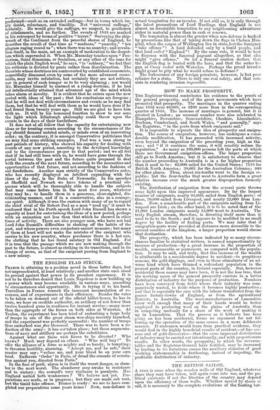HOW TO MAKE PROSPERITY.
TICE Registrar-General contributes his evidence to the proofs of the general prosperity, and of the great movements which have promoted that prosperity. The marriages in the quarter ending June 1852 were 40,000, or 5280 more than in the corresponding quarter of 1848. The increase of marriages is general, but it is greatest in London ; an unusual number were also celebrated in Hampshire, Devonshire,' Somersetshire, Cheshire, Lincolnshire, Durham, Cumberland, and South Wales, " and generally," says the Registrar, " in the ports from which emigrants sail." It is impossible to separate the idea of prosperity and emigra- tion. The course of emigration, however, has undergone a consi- derable modification. It has proceeded with increased activity, even beyond the emigration of the preceding year, high as tha was • and " if it continue the same, it will sensibly reduce the population." As many as 109,000 persons left the ports at which there are Government emigration-offices. The larger proportion still go to North America; but it is satisfactory to observe that the number proceeding to Australia is in a far higher proportion than it used to be : 62,000 sailed for the United States ; 7116 for British North America; 38,601 for the Australian Colonies; 940 for other places. Thus, about six-tenths went to the foreign re- public; but the four-tenths that went to Australia form a great relative increase over the much greater disproportion formerly existing.
The distribution of emigration from the several ports throws some light upon this improved appearance. By far the largest number of emigrants, nearly 95,000, sailed from English ports : of these, 70,000 sailed from Liverpool, and nearly 22,000 from Lon- don. Now, a considerable part of the emigrants sailing from Li- verpool are Irish ; on the other hand, it is to be noted that of the 21,000 London emigrants nearly 15,000 went to Australia. The truly English stream, therefore, is directing itself more than it used to do to the South ; and it appears to be modified in no small degree by the facility of finding ports. We may infer that if emigration-ports were provided at distances more accessible to the several counties of the kingdom, a larger proportion would choose that destination.
The prosperity, which has been indicated by so many circum- stances familiar to statistical writers, is caused unquestionably by increase of production—by a great increase in the proportion of wealth, oonsnmeable or permanent, as compared with the popula- tion. It may be said, and truly, that this increase of the wealth is attributable in a considerable degree to accident—to propitious seasons, the gold-diggings, and even to those stimulants of an ad- verse kind which have thinned a redundant population in the poorest parts of the country, in Ireland especially. But, however accidental those causes may have been, it is not the less true, that the working cause of the general prosperity consists in a better distribution of industry for the purposes of production. Numbers have been conveyed from fields whore their industry was com- paratively wasted, to fields where it becomes highly productive ; and that is especially the ease with the labour transferred from the poorer factory-towns of England, or from the agricultural districts, to Australia. The wool-manufacturers of Lancashire know well enough that many of their hands would be better employed in producing wool on the plains of A.ustralia than in competing uselessly for a share of the work of making it up in Lancashire. That the process as it hitherto has been going on has been accidental, forms no argument for not fol- lowing up the operation of the same causes in a more deliberate manner. If statesmen would learn from practical evidence, they would find in the highly beneficial results of accident—of fine sea- sons and of gold-discoveries—that the same improved distribution of industry, may be carried out intentionally, and with proportionate results. In other words, the prosperity, to which the revenue- tables and the Registrar-General have testified, may bo increased by lending to its fortuitous causes the auxiliary stimulus of good working statesmanship in furthering, instead of impeding, the profitable distribution of industry.


























 Previous page
Previous page